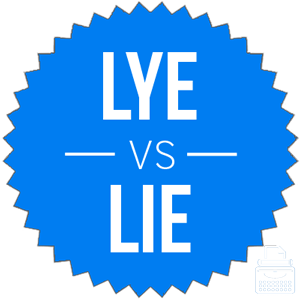Irregular verbs are a headache for even the most experienced writers.
Take lie for example. As a present participle, the word is conjugated to lying.
Given this irregular spelling, it makes sense that some writers would be tempted to include the Y in other conjugations, even the base form lye.
Unfortunately, though, lye is a separate word with its own meaning. It is never a conjugation of the verb to lie, but you might come across it anyway.
What is the Difference Between Lye and Lie?
In this post, I will compare lye vs. lie and will use each word in a few example sentences. That way you can see how they appear in context.
Plus, I will show you a helpful memory tool that will help make choosing lye or lie a little easier.
When to Use Lie
 What does lie mean? The word lie can mean several different things. Sometimes, it is a noun that means a falsehood or untruth.
What does lie mean? The word lie can mean several different things. Sometimes, it is a noun that means a falsehood or untruth.
Lie also has a verb sense of this meaning, namely, to intentionally mislead someone by not telling the truth.
For example,
- Aaron will often lie to his parents about doing his homework so that he has more time to play video games.
- “I cannot tell a lie,” said the young George Washington. “I chopped down the cherry tree.”
- Test Scores Don’t Lie: Charter Schools Are Transformative –The Wall Street Journal
Lie can also be a verb meaning to recline horizontally.
For example,
- You need to lie down and get some rest, or you will never recover from your cold.
- The cats lie around the house all day, but they terrorize each other all night long.
Lie down or lye down? When talking about reclining or taking a nap, the correct spelling is lie down, not lye down.
When to Use Lye
 What does lye mean? Lye is a noun. Lye is a word for the chemical sodium hydroxide.
What does lye mean? Lye is a noun. Lye is a word for the chemical sodium hydroxide.
There are many uses for this chemical. Lye is an important component of the process of making soap, and it can also be used to cure some foods. Lye is also used as a household cleaner.
It is very caustic: users must wear durable protective equipment because lye will cause painful burns if it comes into contact with the skin. Lye has a sordid history due to its ability to degrade tissue. Several murderers have used lye to dissolve the bodies of their victims, sometimes turning them into soap.
Here are some sentences that contain the word lye:
- Pour lye down the shower drain to remove clogs, but be careful it doesn’t splash onto your skin.
- Homemade soap can feel fresh and invigorating, but many potential soap makers are turned off by the dangers of working with lye.
- The defining “secret” of pretzels is lye, a powerful alkali that gives them their defining contrast between a creamy white interior and a crunchy, dark-brown, lightly bitter crust. –The New York Times
Trick to Remember the Difference
 Lye is only used to refer to sodium hydroxide. For just about every other usage, choose lie instead.
Lye is only used to refer to sodium hydroxide. For just about every other usage, choose lie instead.
Lie vs. Lye Check: Lye contains the letter Y, just like the word soapy. If you can remember that lye could cause a soapy, dangerous mess, you can remember when to use this word.
Summary
It is lie or lye? Lye is a word for the chemical sodium hydroxide. Lie has many meanings as a noun and a verb, especially a falsehood, to tell a falsehood, and to recline horizontally.
To summarize,
- Lie means to tell a falsehood or recline.
- Lye is a chemical.
Contents
